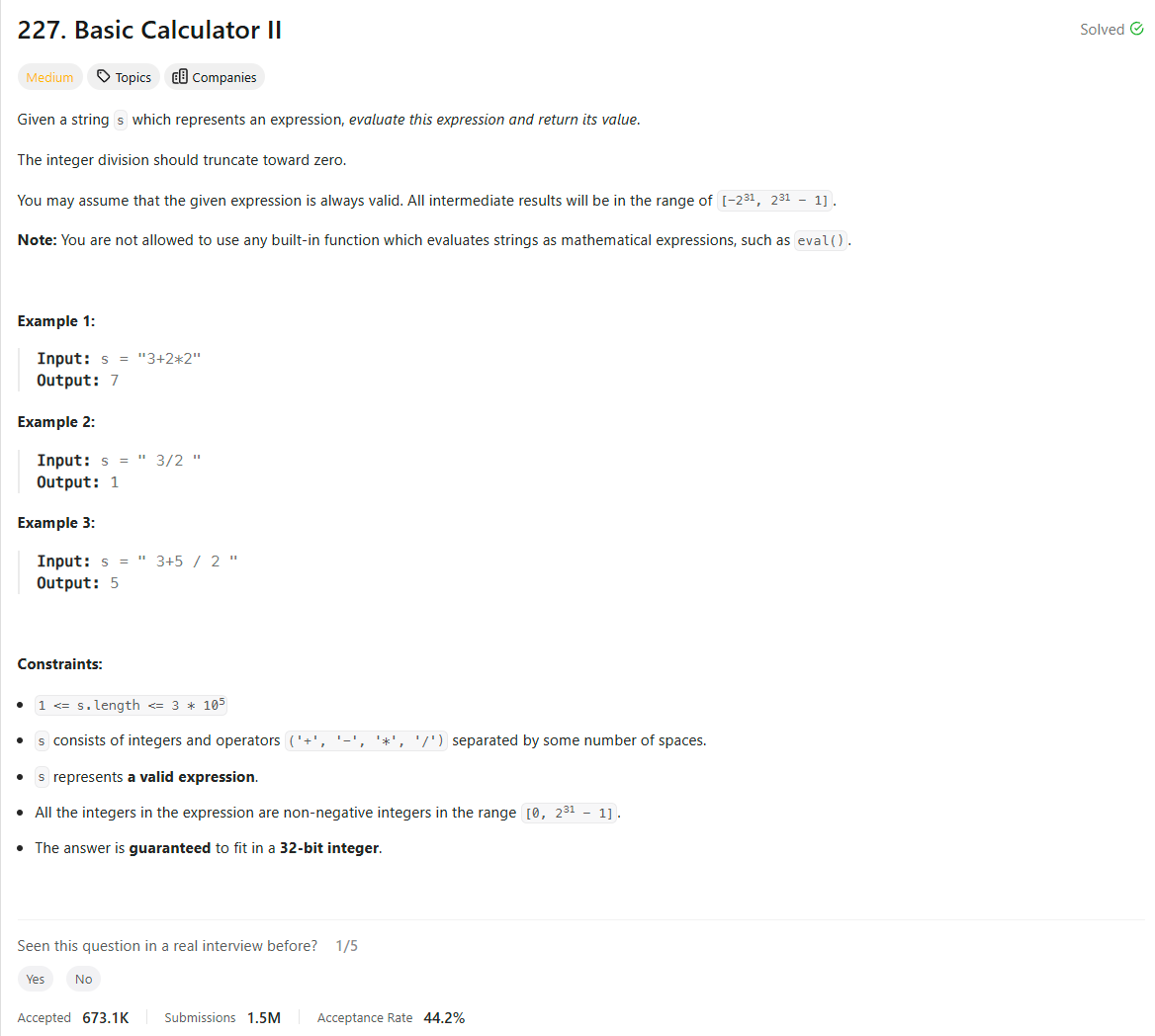Problem of The Day: Basic Calculator II
Problem Statement

Intuition
The problem requires evaluating a mathematical expression containing basic arithmetic operations such as addition, subtraction, multiplication, and division. Initially, I thought about using a stack or queue to process the expression step by step and handle operator precedence. Specifically, multiplication and division should be evaluated first before addition and subtraction.
Approach
- First, I clean up the input string by removing spaces to make parsing easier.
- I iterate through the string to separate out numbers and operators. Each number and operator is pushed into a queue to maintain the order.
- In the first pass, I process all multiplication and division operations since they have higher precedence. For each of these operations, I remove the operands from the queue, perform the calculation, and push the result back.
- In the second pass, I process the remaining addition and subtraction in the same way.
- The final value left in the queue is the result of the entire expression.
Complexity
-
Time complexity: The time complexity is \(O(n)\) because we iterate over the string twice, once for parsing the string and once for evaluating the operations.
-
Space complexity: The space complexity is \(O(n)\) as we store the parsed tokens (numbers and operators) in a queue.
Code
from collections import deque
class Solution:
def calculate(self, s: str) -> int:
s = s.replace(" ", "")
calc_expr = {
'+': lambda x, y: x + y,
'-': lambda x, y: x - y,
'*': lambda x, y: x * y,
'/': lambda x, y: x // y,
}
queue = deque()
start = end = 0
for end in range(len(s)):
if s[end] in ('+', '-', '*', '/'):
queue.append(s[start:end])
queue.append(s[end])
start = end + 1
queue.append(s[start:end+1])
next_queue = deque()
while queue:
ch = queue.popleft()
if ch in ('*', '/'):
x = int(next_queue.pop())
y = int(queue.popleft())
val = calc_expr[ch](x, y)
next_queue.append(str(val))
else:
next_queue.append(ch)
while len(next_queue) > 1:
x = int(next_queue.popleft())
op = next_queue.popleft()
y = int(next_queue.popleft())
val = calc_expr[op](x, y)
next_queue.appendleft(str(val))
return int(next_queue[0])
Editorial
Approach 1: Using Stack
class Solution {
public:
int calculate(string s) {
int len = s.length();
if (len == 0) return 0;
stack<int> stack;
int currentNumber = 0;
char operation = '+';
for (int i = 0; i < len; i++) {
char currentChar = s[i];
if (isdigit(currentChar)) {
currentNumber = (currentNumber * 10) + (currentChar - '0');
}
if (!isdigit(currentChar) && !iswspace(currentChar) || i == len - 1) {
if (operation == '-') {
stack.push(-currentNumber);
} else if (operation == '+') {
stack.push(currentNumber);
} else if (operation == '*') {
int stackTop = stack.top();
stack.pop();
stack.push(stackTop * currentNumber);
} else if (operation == '/') {
int stackTop = stack.top();
stack.pop();
stack.push(stackTop / currentNumber);
}
operation = currentChar;
currentNumber = 0;
}
}
int result = 0;
while (stack.size() != 0) {
result += stack.top();
stack.pop();
}
return result;
}
};
- time: O(n)
- space: O(n)
Approach 2: Optimised Approach without the stack
class Solution {
public:
int calculate(string s) {
int length = s.length();
if (length == 0) return 0;
int currentNumber = 0, lastNumber = 0, result = 0;
char sign = '+';
for (int i = 0; i < length; i++) {
char currentChar = s[i];
if (isdigit(currentChar)) {
currentNumber = (currentNumber * 10) + (currentChar - '0');
}
if (!isdigit(currentChar) && !iswspace(currentChar) || i == length - 1) {
if (sign == '+' || sign == '-') {
result += lastNumber;
lastNumber = (sign == '+') ? currentNumber : -currentNumber;
} else if (sign == '*') {
lastNumber = lastNumber * currentNumber;
} else if (sign == '/') {
lastNumber = lastNumber / currentNumber;
}
sign = currentChar;
currentNumber = 0;
}
}
result += lastNumber;
return result;
}
};